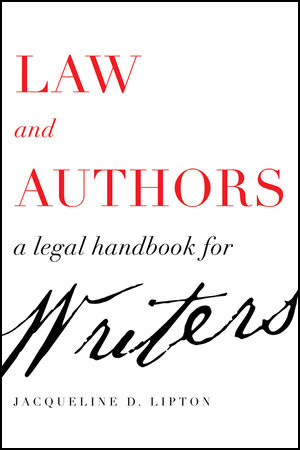
Authors Alliance is grateful to Jacqui Lipton for this guest post on domain names for authors. Her new book, Law and Authors: A Legal Handbook for Writers, is an approachable, reader-friendly resource to help authors navigate the legal landscape of the contemporary publishing industry. Through case studies and hypothetical examples, Law and Authors addresses issues of copyright law, including explanations of fair use and the public domain; trademark and branding concerns for those embarking on a publishing career; laws that impact the ways that authors might use social media and marketing promotions; and privacy and defamation questions that writers may face. Get your copy today from the University of California Press (use discount code 17M6662 for 30% off).
* * *
Not all authors have, or even want, their own website. Some are happy to rely on social media like Facebook, Twitter, Instagram etc., to connect with readers. Even those who do have a website may choose to use a service like WordPress which can provide a sub-page for a blog or website without the need to register a dedicated domain name. This column is for those who are considering venturing into the often murky waters of domain name registration.
Many people would tell you that Internet domain names are no big deal; they’re just so last century. In a sense that’s true. In the mid to late 1990s, Internet domain names were the most effective way for people to find you online because search engines weren’t nearly as sophisticated as they are today. Today, if people want to find you they just Google you.
For example, if you Googled “Sarah Perry”, you’d get a list of results that probably prioritizes a bunch of different people including two authors with that name: one, an American memoirist and the other, a British novelist. The search engine results would likely prioritize the British novelist because search engine algorithms, like Google’s, use a number of factors to identify the most relevant search results, including how often a particular page is accessed. Because the British author is more well-known, her page has likely been accessed more often than the American author with the same name.
However, those algorithms also use domain names to prioritize search results, which is why domain names are still important. Try searching some of your favorite authors and artists online. Those who hold a relevant domain name are likely to be in the top ten results.
Pinning Down a Domain Name
Securing a domain name that corresponds with your personal name may be more difficult than you expect: for example, in the Sarah Perry context, the British author uses “sarahperry.net” while the American memoirist uses “sarahperryauthor.net”. Neither uses the arguably more intuitive “sarahperry.com”. While a lot people say that the “.com” version of your name is important, that’s a lot less true today than it was in the past and it’s arguably less true for people’s names than for corporate trademarks.
Domain names are generally registered on a first come, first served basis, so the first person to register “sarahperry.com” will generally take the name, subject to any later legal challenges or complaints. Most of those challenges are based on trademark rights and it’s important to note that authors typically can’t claim trademarks in their names, at least under American trademark law.
If you are concerned about someone else using your name as a domain name, you can attempt an online arbitration under the Uniform Domain Name Dispute Resolution Policy (URDP) established by the Internet Corporation for Assigned Names and Numbers (ICANN) in 1999. The UDRP is fast, online and much less expensive than court proceedings. More importantly, UDRP arbitrators have accepted trademarks in personal names much more often than American courts typically do, although they’ve tended to be celebrity names like Julia Roberts and Al Pacino.
To win a URDP arbitration, you need to establish that (a) the domain name is identical or confusingly similar to your trademark, so it only works if your name is accepted as a trademark; (b) the registrant has no rights or legitimate interests in the domain name; and, (c) the domain name has been registered and is being used in bad faith. While this sounds simple, it’s not easy for an author to establish all these things. In particular, it’s often difficult to prove that the domain name has been registered in bad faith, even if it was registered by a domain name speculator (often called cybersquatter) in the hopes of making money selling it to someone with an interest in it.
Many speculators register bulk domain names with no idea as to whether the names match someone else’s brand or trademark in the hopes that some of the names will become valuable in the future. They make their money by registering large numbers of names at low cost and then charging high prices when someone later wants the name. In these situations, the speculators can argue that they didn’t register the name in bad faith because they didn’t know any other person had an interest in it at the time of registration. This may well be what happened with “sarahperry.com” which is currently offered for sale through GoDaddy, probably for a price significantly higher than it would cost to register an alternative domain name. This may explain why neither of the “Sarah Perry”s uses the “.com” version of their name.
UDRP arbitrations are simple and inexpensive, but they are often of limited use to authors in the absence of a trademark.
What about Negotiation?
Most lawyers will suggest that the first (and often easiest) strategy to try and wrangle control of the domain name you want is to contact the person who registered it and find out if they will sell it for a reasonable price. They may ask more than the cost of registering an alternative name, but it may still be cheaper than attempting to use the UDRP and it may be worth it depending on how important it is for you to secure a particular name. In the Sarah Perry situation, presumably neither author thought it was worth paying more than they needed to as they were each able to find viable options.
Bear in mind that some people will not be prepared to sell you a name they have registered because they are using it themselves. They might be prepared to put a link to your website on their page, depending on the circumstances, though, so it may be worth asking in any event.
Search Engine Optimization (SEO)
If you’ve heard the term “SEO” and don’t understand it, it’s basically just a way of referencing techniques you can use to ensure that your website is prioritized in search results regardless of your domain name. The precise ways to do this change over time as search engine algorithms change, and people find better ways of playing the system.
SEO isn’t a legal issue. It’s a matter of being tech-savvy. A number of companies specialize in SEO and you can pay them to teach you how to prioritize your website in search engine results. Many of the popular web hosting packages offer SEO as an add-on service. Google also offers statistics and strategies for SEO including a free online SEO Starter Guide and a free service, Google Analytics, which breaks down the figures related to who is visiting your website and how often.
You can end up spending a lot or a little on your web presence, and attempts to make it easily searchable. There’s no one right way to be online, and it’s best to find what you’re comfortable with than to try and do everything, but if you do venture into domain name territory, hopefully this blog post has given you some guidance. If you’re not the website type, social media can be just as effective and potentially a lot more interactive. But that’s a whole other blog post …

Jacqui Lipton is the founder of Raven Quill Literary Agency as well as a consultant on business and legal issues for creative artists. She also teaches law and legal writing at the University of Pittsburgh, as well as several online venues. She writes regular columns on legal and business issues for authors for SCBWI, Luna Station Quarterly, Catapult, and Savvy Authors. Her book Law and Authors: A Legal Handbook for Writers is available from University of California Press.
Discover more from Authors Alliance
Subscribe to get the latest posts sent to your email.
